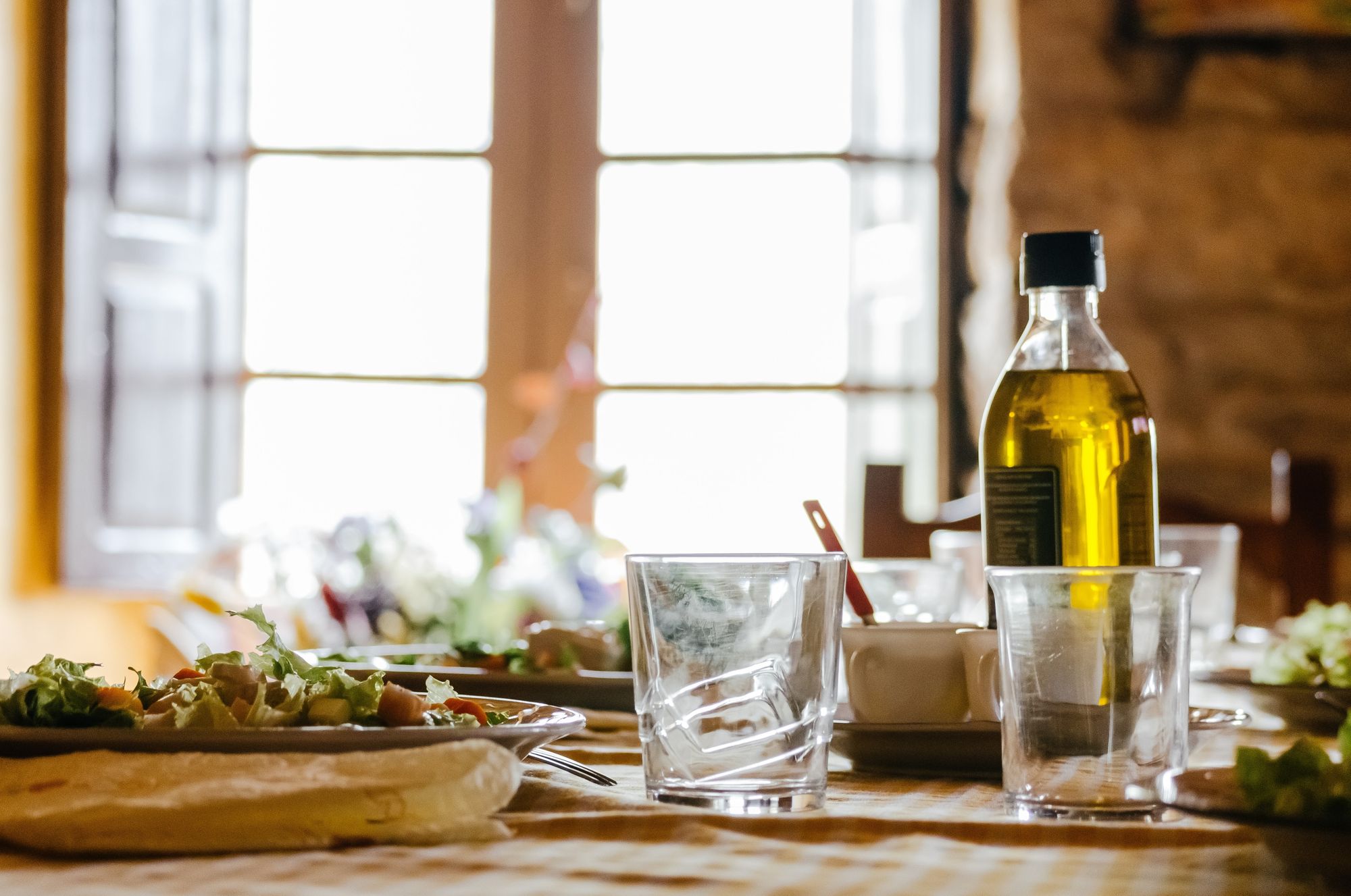8 Inflammatory Oils to Avoid and the Best Oils to Cook With

Most of us use oils in our cooking every day and since oils are in most packaged foods, they have a huge impact on our health. Unfortunately, the oils we’ve been told are “heart healthy,” are actually contributing to inflammation, digestive conditions and hormone imbalances.
For many years, we were told to avoid saturated fats like coconut oil and butter and instead, cook with vegetable oils. Most of us grew up thinking margarine was superior to butter and used oils like canola to cook with. We were led to believe that these oils were heart healthy and helped lower cholesterol.
I believe this is one of the greatest nutrition myths out there.
If you feel totally confused about what to look for on food labels and what oils to use in your kitchen, you’re not alone! There’s a lot of misinformation out there so, let’s break down exactly what vegetable oils are, how they affect our health and how to cut back on vegetable oils in your diet. Then, I’ll share the oils I use in my kitchen everyday.
What are Vegetable oils?
First things first, vegetable oils aren’t actually made from vegetables, but rather from the seeds of plants. Creating an oil from these seeds involves a significant amount of processing at high temperatures, refining, bleaching and deodorizing. Hexane, a neurotoxin derived from crude oil, is commonly used to extract the oil from the seeds.
Vegetable oils are one of the most denatured products on store shelves.
If you struggle with chronic fatigue, gut issues like IBS, bloating or acid reflux, acne, painful periods or stubborn weight loss, vegetable oils might be a big part of the problem.
List of vegetable oils:
- corn oil
- soybean oil
- safflower oil
- sunflower oil
- canola oil
- cottonseed oil
- grapeseed oil
- rice bran oil
- shortening
- margarine
- most plant based spreads are also made with vegetable oils
Often, these oils are combined to make standard “vegetable oil.”
Why I recommend cutting back on vegetable oils
They undergo so much processing, I’d argue they’re not even real food.
Vegetable oils are processed under high heats which causes them to oxidize and become rancid before they even end up on store shelves.
Vegetable oils are chemically unstable fats which means they create a lot of free radical damage in our bodies. Free radical damage is a main cause of inflammation and aging..
Vegetable oils are high in polyunsaturated fats which are easily damaged when exposed to heat, light and oxygen. Even if they weren’t already damaged during processing, cooking with them is enough to create oxidation.
Vegetable oils provide zero nutritional value.
We do need some omega-6 fats but as vegetable oil consumption has skyrocketed over the past hundred years, most people are now eating far more omega-6 fats compared to omega-3.
This skewed ratio is a major contributor to inflammatory conditions.
The majority of vegetable oils are derived from genetically modified crops. GMO’s are organisms that have been artificially engineered in a lab.
The bottom line is, vegetable oils are PRO-inflammation.
Consuming them on a regular basis affects our gut lining which impairs digestion and sets us up for conditions such as acid reflux, chronic bloating and IBS.
According to Dr. Catherine Shannahan M.D., vegetable oils also affect our metabolism because extra polyunsaturated fats get stored in our fat cells.
How to Cut Back on Vegetable Oils
Take a look at the ingredient list on almost any packaged food product and you’ll probably see vegetable oil. It’s nearly impossible to avoid them entirely since the majority of restaurants cook their food with them, but don’t be discouraged!
We don’t need to be “perfect” with our eating choices. What we can do is become aware of what’s in our food and take steps to limit vegetable oils in our diet.
Many of my clients have seen fantastic results in improving issues like acne, arthritis, bloating and dysmenorrhea (painful periods) from making one change - cutting back on vegetable oils.
Where to start:
1. Make sure the cooking oils you use for cooking, sautéing and baking are anti-inflammatory (keep reading for my suggestions)
2. Begin looking for vegetable oils on the ingredient lists of packaged foods.
They hide in many products, even those labelled as organic!
A few of the most common foods with vegetable oils are: salad dressings, cereals, bread, pasta sauce, granola and protein bars, chips.
Start by doing an inventory of the food products you eat the most often and replace those products when you’ve finished them. For example, if you eat pasta regularly and notice your sauce has a vegetable oil, finish it up and look for a sauce made with olive oil.
Look for products made with olive, avocado or coconut oil.
3. Avoid margarine and plant-based spreads
Margarine is made with vegetable oil. Most plant-based spreads are also made with vegetable oil. The oils used in these products are usually hydrogenated, a process that turns a liquid oil into a solid fat.
So now we know why limiting vegetable oils is important. But what oils should you use to cook, fry or bake with?
My favorite oils:
Coconut Oil: This tropical oil is made of medium-chain fatty acids which are quickly metabolized by the liver and used for energy. Coconut oil is high in antioxidants, which reduce inflammation and help to combat free radical damage. It also has anti-viral, anti-fungal and antibacterial properties.
Coconut oil can be used to sauté foods and as a replacement for butter in baking. If you don’t like the flavor, try refined oil which has had the fibre removed.
Butter and ghee: Our grandmothers had it right when they cooked with butter, before margarine and plant spreads were invented. Butter is best when it’s made from grass-fed cows and is a rich source of fat soluble vitamins A, E, D and K.
Extra virgin olive oil and avocado oil: While these oils are great for lower-temp cooking, they also make wonderful homemade salad dressings. Making your own dressing with olive or avocado oil, vinegar of your choice, salt and pepper is a great way to avoid vegetable oils that are often used in prepared dressings.
When shopping for olive and avocado oil, look for products in dark bottles as light exposure can cause them to turn rancid. These oils are best stored in a cool, dry space in your home.
Final Words
I strongly believe that reducing your consumption of vegetable oils is one of the most powerful changes you can make for your health. Once you start looking at food labels, it’s easy to be discouraged because vegetable oils are hidden in so many food products. I recommend starting slow! Begin by making sure you’re using good quality oils in your kitchen. Then, look at the packaged foods you eat most often. If they have vegetable oils, look for an alternative.
About The Author
Danielle Goobie is a Well Me Right Wellness Expert. She went from riding the blood sugar rollercoaster daily and dreading my debilitating periods to understanding my body and feeling confident about how to care for it. She spent years learning how food, movement and environment affect our gut and the female endocrine (hormone) system. Now, she helps women just like you re-connect to the needs of their bodies so they can eat, move and live in a way of intentional nourishment. She specializes in: gut health, acne, PCOS and period problems, thyroid conditions, and blood sugar dysregulation.
Book Wellness Expert sessions offered by Danielle on Well Me Right.
Article References
Axe, D. J. (2022, March 6). Stop using canola oil immediately! Dr. Axe. Retrieved August 23, 2022, from https://draxe.com/nutrition/canola-oil-gm/
Tweed, V. (2021, March 4). 8 bad seed oils you should replace. Better Nutrition. Retrieved August 24, 2022, from https://www.betternutrition.com/diet-and-nutrition/8-bad-seed-oils-you-should-eliminate-from-your-diet/
Hari, V. (2020, June 9). Processed to death - get these cooking oils out of your pantry stat! Food Babe. Retrieved August 26, 2022, from https://foodbabe.com/cooking-oils/
Shanahan, D. C. (2022, August 20). List of good fats and oils versus bad. Dr. Cate. Retrieved August 21, 2022, from https://drcate.com/list-of-good-fats-and-oils-versus-bad/
